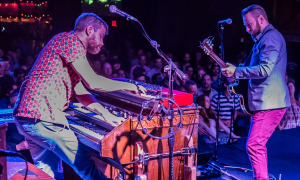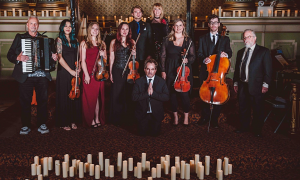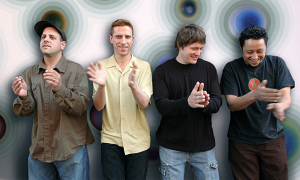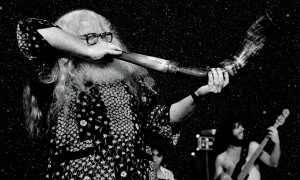Home » Jazz Articles » From the Inside Out » Monsters from the Jazzlab
Monsters from the Jazzlab
 Rodrigo Almonte
Rodrigo AlmonteDistancia
Odradek Records
2021
"Every piece of music on Distancia is an honest representation of a pilgrimage of different distances that I had to walk, musically and geographically speaking, in order to find inspiration and to create a representation of myself as a musical nomad," explains guitarist Rodrigo Almonte, who was born and raised in Peru, completed Bachelor of Arts studies in Ireland and Brazil, and his Masters studies in New York and The Netherlands.
As a result, Distancia presents a unique travelogue based on Almonte's Dublin home as its epicenter, and every song title includes a measure of meters walked away from that homebase. It centers around Almonte's guitar and its shimmering sonic similarities to the music of guitarists such as Pat Metheny and Terje Rypdal, sometimes even Tal Farlow. But the Metheny comparison seems most accurate not only for the sound of Almonte's guitar but for the way they, as leaders, so deeply embed their own guitar sound in arrangements designed to complement the sounds from other musicians playing in their groups.
When coupled with the sound of saxophonists Daniel Juarez (tenor) or Michael Moore - Clarinet (alto), or pianist Lorenzo Vitolo, Almonte's guitar sound truly flourishes. A beautiful, almost otherworldly lushness permeates the Andean lament "Toribio." Bassist Rafael Abdalla lays down the opening pulse but then drifts away, leaving Almonte's guitar to direct the meandering melody into quicker jazz time, then pick up and double Vitolo's long melodic lines in a guitar voice so close to the piano that they're impossible to hear separately.
Saxophonist Moore sharply navigates the open framework of "Shorter Steps," from singing the opening melody all the way through to feathered, fluttering notes that drift into silence for its ending. Each note of Almonte's guitar sound, a poignant mix of sorrow and joy, lingers and then dissolves into the air like blue smoke, while drummer Roberto Pistolesi keeps the underlying rhythm both supportive and elastic. "Nothing has resonated with me as much as the music of Wayne Shorter," explains Almonte. "This ballad is my interpretation of what his music evokes in me."
"The Journey Of The Lonely Cloud" is a perfect description of this title's movement and sound: The full band sound pulls back into a spotlight for bassist Abdalla, whose vibrant yet temperate colors provide shade and cover for the piano solo that follows. Yet another luscious guitar solo somehow sounds both accessible yet abstract, difficult to figure but easy to hear; in their solos and accompaniment, drummer Pistolesi and pianist Vitolo stretch out the tune's time and pace, which gives Almonte's lead guitar even more space to burn and glow.
 Beledo
BeledoSeriously Deep
MoonJune Records
2021
Beledo's second MoonJune release flows through the listener's ears like the cinematic adaptation of an epic novel, but in sound. Seriously Deep quite deliberately moves from scene to scene (song to song), building up and releasing tension in music that sounds much too powerful and deep to have been primarily created by only three musicians: Uruguayan multi-instrumentalist Beledo on electric guitar and acoustic piano with drummer Kenny Grohowski and master bassist Tony Levin. Within each song, this movement consists of undetectable transitions between composed and improvised music. "Improvisations are an aspect that takes more than fifty percent of my compositions and when it comes to my guitar playing it is the aspect that I feel allows me to express my true self," Beledo explains.
In "Mama D," featuring Botswanese vocalist Kearoma Rantao and written in memory of late South African singer Dorothy Masuka, Beledo plays with such a clear and bright tone that his guitar first suggests a trumpet and then a singing voice before spacewalking out into an Allan Holdsworth-style progressive jazz-rock jam. "Mama D" slips into "Coasting Zone," a tight arrangement that opens with a loose, swinging jazz shuffle feeling. Levin and Grohowski keep the rhythmic heat rising beneath the one Beledo solo on this set that bows toward his MoonJune labelmates, Indonesian guitar pioneers Dewa Budjana and Tohpati.
The title piece serves as this set's focal point even though it's the opening track, as the band collaboratively paints a dreamy fourteen-minute journey through a song composed by bassist Eberhard Weber for his release Silent Feet (ECM, 1977). Levin's doubling on bass thickens and underlines the guitar into a radiantly beautiful sound, and Beledo's double-tracked acoustic piano and electric guitar sounds mesh like the left and right hands of one musical spirit. "Seriously Deep" surely sounds beautiful, but it's something more than beautiful, too. It's profound, thoughtful, and timeless, and it may sound strange but this music is good for getting (back) in touch with your soul.
The trio bounces "Into The Spirals" with a jazz-funk bass and drumbeat kept moving by Grohowski's pinwheeling snare drumrolls. Beledo's guitar lines swirl and ascend (spiral) like a tornado's updraft, creating a wide-open, uncluttered jam feeling that ends this set of more abstract music with a grin.
 Extreme Flute
Extreme FluteForever
Self-Produced
2021
Canada's Bill McBirnie is known around the world for his flute prowess in Latin, pop, jazz and classical music settings. For example, he was personally recruited by Sir James Galway to serve as Resident Jazz Flute Specialist on Galway's official website. McBirnie published The Technique and Theory of Improvisation: A practical guide for flutists, doublers and other instrumentalists in 2019. He has recorded as sideman with artists in styles ranging from Irakere to Junior Mance. McBirnie is also the only triple-crown winner of all three National Flute Association jazz categories: Solo, masterclass, and big band.
Multi-instrumentalist Bruce Jones grew up near São Paulo (Brazil) but his musical travels led him to eventually settle in Canada, where he discovered McBirnie as a kindred musical spirit and teamed to form Extreme Flute. Their self-produced 2015 release Grain of Sand received a Best Instrumental nomination from the Toronto Independent Music Awards; the duo expands (deepens) their sound on Forever by adding bassist Robin Latimer.
In the opening axé/samba "Criole Blessing" ("Saravá Criola"), McBirnie's flute sound floats but remains full and robust, equal parts power and grace. Jones and McBirnie play their percussion and flute rhythms off of each other, dancing from creole composition into jazz improvisation then back again into the tune.
"This Passion" ("Está Paixão"), a bossa-samba, opens with the atmospheric percussion and whispered melody of Sade's smoldering cool "Smooth Operator." McBirnie plays so pure and strong that some parts genuinely sound like he's singing a soulful vocal samba or even R&B tune. His attack is consistently precise and yet often loosens up to relaxedly swing. This is great jazz: the intricacies of European form and structure blended with the release and emotion of American blues and gospel.
Jones' hip rhythm guitar and Latimer's rubbery funk bass line swing the hip-hop/bossa "It's The Time" ("Saber Se Amar") deep into quiet storm jazz, a refreshing oasis of chill from which McBirnie deeply drinks.
Forever ends with the bossa-samba "Full Moon Blue Wolf" ("Lua Cheia Lobo Azul"), a meditation featuring acoustic guitar and lyrics sung by either Jones' voice or McBirnie's flute (sometimes both), and McBirnie's solo lighting up the instrumental bridge with sunny and charming runs.
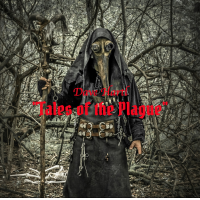 Dave Hartl
Dave Hartl"Tales of the Plague"
Self-Produced
2021
Dave Hartl stretches his prowess on keyboards and many other instruments across several different ensembles in and around Philadelphia, PA: A quartet supporting a vocalist, a Linda Ronstadt tribute/review, a jazz-funk group (Musical Collusion, which also includes saxophonist Carl Cox), and a large esoteric classical ensemble featuring harps, vibraphone and theremin (The Divine Hand Ensemble). He also occasionally sits in with The Hot Club of Philadelphia, a gypsy jazz ensemble playing music that honors Django Reinhardt, plus several other local jazz, ballet, and orchestral ensembles.
The kaleidoscopic, pinballing"Tales of the Plague," primarily featuring Hartl on various keyboards, Chapman stick and guitar, with saxophonist Cox and drummer Josh Orlando (plus Dave's son Miles Hartl on occasional guitar), touches every one of these bases. "The Zen Cabbie" drives it open hard and hot: Cox's soprano cuts the melody right through Hartl's chattering accompaniment then blasts into circular orbit like a spaceship, while drummer Orlando stretches and snaps back its hard rocking beat. "Fungit" shifts the mood from 1990s Miles Davis to 1960s James Brown on a fatback Hammond B-3 organ sound, the Godfather's famous "Cold Sweat" rhythmic push-and-pull, and gutbucket tenor sax that blows soulful and hot. Hartl's solo stirs in New Orleans funk and R&B, and turns its taste into a sweet jazz cocktail.
Hartl steers other tunes toward more reflective, peaceful sounds. His Chapman stick and D'Angelico guitar duet with Orlando's hand percussion to pour out Antonio Carlos Jobim's charming "Favela" like cool, clear flowing water; they leave Orlando behind to paint a lovely solo portrait of the Italian guitar ballad "Estaté." He also journeys solo on synthesizer and accordion through Astor Piazzolla's "Soledad" and on synthesizer and fretless bass through the dreamy "Breath of Helios."
"You're My Humpty," a medley of Chick Corea's "You're My Everything" and "Humpty Dumpty," is another powerful vehicle driven by Hartl's keyboard dexterity and a great performance worthy of its material.
"The past 14 months had proved to be the most creative and prolific year I've ever had in my musical life," Hartl notes on "Tales of the Plague." "Not having to entertain people in a live crowd, and being given total freedom and unlimited time, I found myself working harder in the studio than I ever could have before." Dr. Hartl emerged from his studio lab with an absolute monster.
 JazzLab Orchestra
JazzLab OrchestraLoguslabusmuzikus
Effendi Records
2021
JazzLab Orchestra has been a fixture on the jazz scene in Canada for nearly two decades. Their unique heavy sound features six brass and reed players with a relatively standard piano, bass and drum rhythm section, and they've captured that sound on several standalone recordings and presented it on more than 300 concert stages across North America and Europe.
The music on Loguslabusmuzikus, nine new pieces written by bassist Auguste Le Prez under the subtitle "The New Experience: A Human Adventure Above All," sometimes seems as dense and imposing as that title. Jazzlab is a true Orchestra: Few solos rise above and out of their thickly interwoven ensemble sound, and digesting this sound can be like trying to unravel one enormous knot.
The opening "La Grande Sauve Majeure" ("The Great Major Rescue"), one of three extended (more than ten minute) pieces, comes together through the sound of things falling apart, as the rhythm section and horns enter searching for each other, circling each other, and then finally come together to chew through the melody like a meaty steak. Trumpeter Jacques Kuba Seguin steps out of the mix and then heads straight into orbit, spitting and moaning a spacey blues as the accompaniment keeps shifting beneath him, calling to mind Lester Bowie's solo sound in the collective Art Ensemble Of Chicago (AEC); later, a trombone solo oozes out of the rhythm section like New Orleans hot sauce with honey, pouring jazz that's thick and peppery and sweet.
The blues sound foundational on Loguslabusmuzikus but in the way Charles Mingus used the blues: for tone and as framework for solo rounds, but not for the basic twelve-or sixteen-bar structure. Bassist Alain Bédard opens "Bluesy Del Lunedì" with a nearly straight-ahead walking blues but it often wobbles off (and sometimes finds its way back on) that path. Seguin's hot trumpet solo bubbles out of this mix like a stove pot boiling over. Bédard also sets up "Lunes & Marées" as a more cogent walking blues that mostly remains on course.
Loguslabusmuzikus often—and simultaneously—resurrects and transmits echoes of Miles Davis' Birth of the Cool orchestral sound and the communal spirit of jazz collectives such as Oregon or the AEC, but it's not for the faint of musical heart.
 Chris Trinidad
Chris TrinidadChanging Tides
Iridium Records
2021
During the course of 2021's lockdowns and distancing, music educator and bassist Chris Trinidad began to wonder if technology was bringing people together or keeping people apart. During these reflections, he reengaged with music he had written years earlier, for a release he titled Certain Times (Iridium, 2014). "The compositions on that album were written in a span of seven days in the midwinter month of December 2013," Trinidad notes on Changing Tides. "During the liturgical season of Advent, the time in the Western Christian calendar when expectant waiting and preparations for Christmas took place."
In this spirit of "expectant waiting," the bassist virtually reconnected with several colleagues, spanning several continents and musical styles, and asked them to formulate new arrangements of 2014's Certain Times to reflect 2021's Changing Tides. Trinidad digitally distributed these new charts to an ensemble including pianist Christian Tumalan (co-conspirator on 2019's Chris Trinidad y Con Todo and co-leader of the Pacific Mambo Orchestra), tenor saxophonist Reggie Padilla and trombonist Jamie Dubberly, and each musician recorded their individual parts "remotely in isolation in California, Hawaii, Texas, New York, and British Columbia."
Saxophonist Charlie Gurke (UK) and pianist Alex Conde (Spain), two musicians from 2014's baseline recording, reshape two titles that seem to predict their 2021 reimagining. Conde rebuilds "Something New in the Familiar" upon a bouncy drum beat, then polishes it with smooth rhythm guitar and Dubberly's high-stepping trombone solo into a sunny Caribbean/Latin sheen. "I remember quite distinctly Alex suggesting that we lay down this track with a more explicit funk-informed vibe," Trinidad notes.
Gurke's take on "A Reading in Retrospect" is a genuine masterpiece of understated yet swinging ensemble jazz. The trumpet issues the ensemble's first call, but echoing horns quickly follow one by one, each coming in one beat later so their accumulating sound seems to cascade like a waterfall. Bassist Trinidad overlays strong, stretchy lines across David Rokeach's drum patterns to provide a firm yet supple foundation, and pianist Tumalan swings into a jazzy spotlight that seamlessly shifts from improvisation into accompaniment to tie all the horn sections back together.
"The Benefit of Hindsight," arranged by Jared Burrows (Canada), spotlights guitarist Alex Hand's metallic fireworks and Trinidad's extended, more melodic solo. Ivor Holloway (US/UK) stirs more hot Latin pepper into his arrangement of the closing "Though Certainly Speaking." With Trinidad's plucky bass, José Sanchez's funky percussion and Tumalan's propulsive piano pumping its rhythmic bellows, soloists Hand (guitar) and Padilla (saxophone) grab on, jump in, and soar up, up and away!
Tracks and Personnel
DistanciaTracks: Toribio; OCD; Crown Heights; Shorter Steps; Noggin; Utjawi; The Journey Of The Lonely Cloud; In The Depth Of Winter.
Personnel: Rodrigo Almonte: guitar; Daniel Juárez: tenor saxophone; Lorenzo Vitolo: piano; Rafael Abdalla: bass; Roberto Pistolesi: drums; Rogerio Boccato: percussion; Michael Moore: alto sax.
Seriously Deep
Tracks: Seriously Deep; Mama D; Coasting Zone; Maggie's Sunrise; Knocking Waves; A Temple In The Valley; Into The Spirals.
Personnel: Beledo: guitars, acoustic piano, synthesizer; Tony Levin: upright bass, bass guitar; Kenny Grohowski: drums; Jorge Camiruaga: vibraphone; Kearoma Rantao: vocals; Boris Savoldelli: vocals.
Forever
Tracks: Criole Blessing (Saravá Criola); Song For Svetlana (Um Choro Para Svetlana); This Passion (Está Paixão); It's The Time (Saber Se Amar); Forever (Eternamente); Dreams And Light (Canta Canção); Full Moon Blue Wolf.
Personnel: Bill McBirnie: flute, alto flute; Bruce Jones: guitar, percussion, synthesizer, vocals; Robin Latimer: electric bass.
"Tales of the Plague"
Tracks: The Zen Cabby; Fungit; Favela; Daddy Wallets; Breath of Helios; Forsooth; Soledad; Heart Like a Wheel; Estaté; Little Orange Fingers; Ready Step RBG; Saikou; You're My Humpty; I Don't Know What I Said, I Don't Remember.
Personnel: Dave Hartl: keys, accordion, bass, Chapman Stick; Josh Orlando: drums; Carl Cox: saxophones; Miles Hartl: stunt guitar; Grant MacAvoy: drums; Gesenia Erolin: vocals; Paula Johns: vocals.
Loguslabusmuzikus
Tracks: La Grande Sauve Majeure; Humor De La Seconda Noche; Pum La Suite; Bluesy Del Lunedì; Criucm; Le Grain Blanc Dans Les Voiles; Casse-Pattes/Casse-Gueule/Casse-Tête; Lunes & Marées; Compte-Rendu II.
Personnel: Mario Allard: clarinet, alto sax, soprano sax; Alain Bédard: contrabass; Samuel Blais: bass clarinet, soprano sax; Benjamin Deschamps: flute, soprano sax, trombone; Michel Lambert: drums; Thomas Morelli-Bernard: trombone; Jacques Kuba Seguin: trumpet; Félix Stüssi: piano.
Changing Tides
Tracks: Inevitable Evolution; Something New In The Familiar; The Benefit of Hindsight; Finding Somewhere Forever; A Reading in Retrospect; Transcending December; Though Certainly Speaking.
Personnel: Chris Trinidad: bass guitar; Reggie Padilla: saxophones; Jamie Dubberly: trombones; Miguelito Valdes: trumpets, flugelhorns; Evan Francis: flute; Alex Hand: guitars; Christian Tumalan: piano; David Rokeach: drum set; José Sanchez: percussion.
Tags
From the Inside Out
Chris M. Slawecki
Rodrigo Almonte
Odradek Records
pat metheny
Terje Rypdal
Tal Farlow
Daniel Juarez
Michael Moore
Lorenzo Vitolo
Rafael Abdalla
Roberto Pistolesi
Wayne Shorter
Beledo
Kenny Grohowski
Tony Levin
Kearoma Rantao
Dorothy Masuka
Allan Holdsworth
Dewa Budjana
Tohpati
Eberhard Weber
Extreme Flute
Bill McBirnie
Sir James Galway
Irakere
Junior Mance
Bruce Jones
Robin Latimer
Sade
Dave Hartl
Self-Produced
Linda Ronstadt
Musical Collusion
Carl Cox
The Divine Hand Ensemble
Django Reinhardt
Josh Orlando
Miles Davis
James Brown
Antonio Carlos Jobim
Astor Piazzolla
Chick Corea
Jazzlab Orchestra
Auguste Le Prez
Jacques Kuba Seguin
Lester Bowie
Art Ensemble of Chicago
Charles Mingus
Alain Bédard
Oregon
AEC
Chris Trinidad
Iridium Records
Christian Tumalan
Pacific Mambo Orchestra
Reggie Padilla
Jamie Dubberly
Charlie Gurke
Alex Conde
David Rokeach
Jared Burrows
Ivor Holloway
PREVIOUS / NEXT
Support All About Jazz
 All About Jazz has been a pillar of jazz since 1995, championing it as an art form and, more importantly, supporting the musicians who make it. Our enduring commitment has made "AAJ" one of the most culturally important websites of its kind, read by hundreds of thousands of fans, musicians and industry figures every month.
All About Jazz has been a pillar of jazz since 1995, championing it as an art form and, more importantly, supporting the musicians who make it. Our enduring commitment has made "AAJ" one of the most culturally important websites of its kind, read by hundreds of thousands of fans, musicians and industry figures every month.








